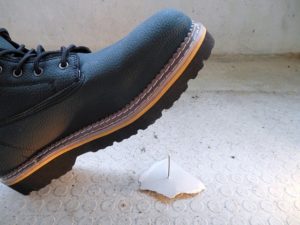
The Claim Process – Vermont Workers Compensation
The Claim Process: How does it work?
 All workers’ compensation claims are overseen by the Vermont Department of Labor. The Vermont Department of Labor writes all the Rules and ensures the laws and rules are followed. Most decisions made by the insurance company in a claim must be documented on the Department of Labor Forms which the insurance company must submit to the Department of Labor. If there is any dispute between the Claimant (the injured worker) and the Defendant (the insurance company), the Vermont Department of Labor handles the disputes.
All workers’ compensation claims are overseen by the Vermont Department of Labor. The Vermont Department of Labor writes all the Rules and ensures the laws and rules are followed. Most decisions made by the insurance company in a claim must be documented on the Department of Labor Forms which the insurance company must submit to the Department of Labor. If there is any dispute between the Claimant (the injured worker) and the Defendant (the insurance company), the Vermont Department of Labor handles the disputes.
Disputes are resolved first through an Informal Phone Conference with an assigned “Specialist” at the Vermont Department of Labor. If a party is unhappy after this stage, either party can ask for a Formal Hearing at the Department of Labor. After the Formal Hearing, either party can appeal to the Vermont Superior Court or to the Vermont Supreme Court, depending on whether it is an issue of law or an issue of fact.
The Role of the Insurance Adjuster
The claim then goes to the employer’s workers compensation insurance where an adjuster must decide whether to approve or deny the claim; they have 21 days to do so. The adjuster will obtain your medical records and may try to interview you. If your claim is approved, the adjuster will review the medical evidence to determine if you are entitled to wage replacement, referred to as temporary total disability.” (Click here for the Vermont Department of Labor webpage further describing the claims process.)
What to Expect From Your Claim
The benefits associated with your claim generally entail payment for any medical care associated with the injury, temporary replacement of lost income, payment for permanent injuries, and compensation to families who lost a loved one on the job. Workers’ compensation laws do not cover pain and suffering, however. Your eligibility for benefits should begin immediately after the claim is filed and will continue for the duration of the injury, even if the injury is permanent.
Denied Claim What if my claim was Denied?
The insurance company must “accept” or “deny” your claim within 21 days of the injury by filing a Form 2 with the Department of Labor. If you are not sure if your claim was accepted or denied, call the Vermont Department of Labor at (802) 828-2286. The insurance company can deny a claim for the following reasons:
- The injury did not occur at work
- The injury was “idiopathic” (it would have happened whether your were working or not)
- The worker was intoxicated when the injury happened
- The worker was engaged in “horseplay” when the injury happened
- The worker is not an “employee”
If your claim is denied, I strongly recommend speaking with a lawyer. Get a copy of the Form 2 denial from the Department of Labor.
 If your claim is denied because the insurance company does not believe it occurred at work, there are several things you can do. First, if there were any witnesses to your injury, get an affidavit (a sworn, written, and signed statement) from the witnesses. If you went to the doctor soon after the incident, get copies of your medical records.
If your claim is denied because the insurance company does not believe it occurred at work, there are several things you can do. First, if there were any witnesses to your injury, get an affidavit (a sworn, written, and signed statement) from the witnesses. If you went to the doctor soon after the incident, get copies of your medical records.
You can also prepare your own affidavit stating what happened. However, I would urge caution in preparing affidavits or written statements — you may inadvertently describe events in a way that is not helpful to your case. Again, I recommend calling a lawyer if your claim is denied.
Please note that it is the Claimant’s (the injured worker) burden to prove that he or she was injured on the job.
Informal Conference
The Informal Conference is the first step of the appeal process in a workers’ compensation claim. It is governed by Rule 16 of the Worker’s Compensation Rules. Whenever there is a dispute between the injured worker (the Claimant) and the worker’s compensation insurance company (the Carrier), the first step for the Department of Labor in addressing that dispute is the Informal Conference.
The Informal Phone Conference is conducted by a person who works at the Vermont Department of Labor, called a “Specialist”. Some examples of disputes that are addressed in the Informal Conference are:
- Denial of a claim
- Termination or discontinuance of temporary weekly benefits
- Failure to pay medical bills
- Disputes about permanent impairment ratings
 At the scheduled time, the Specialist will call the insurance adjuster (or the attorney representing the insurance company) and the Claimant on the phone (both parties usually participate by phone). You will be expected to “make your case” during the conference, in other words, to explain why the insurance company should not be allowed to do what it is doing. It is very important to send all documents, including all medical records, to the Department of Labor before the Informal Conference takes place. The Specialist will ask questions of each party. The phone conference usually takes about 15-30 minutes.
At the scheduled time, the Specialist will call the insurance adjuster (or the attorney representing the insurance company) and the Claimant on the phone (both parties usually participate by phone). You will be expected to “make your case” during the conference, in other words, to explain why the insurance company should not be allowed to do what it is doing. It is very important to send all documents, including all medical records, to the Department of Labor before the Informal Conference takes place. The Specialist will ask questions of each party. The phone conference usually takes about 15-30 minutes.
After the conference is over the Specialist will issue a written decision, usually within 1-2 weeks. The written decision will either “uphold” what the insurance company has done, or, it will issue an Interim Order overturning what the insurance company has done and directing the insurance company to take different action.
If neither party takes any further action after receiving the written decision, this decision will stand. Or, either party can ask that the dispute be placed on the Formal Hearing docket if they are unhappy with the decision after the Informal Conference. This means that a Formal Hearing will be scheduled and a more complete trial will take place, including presentations of evidence and testimony in front of an Administrative Law Judge.
Mediation
Most workers’ compensation disputes are now required to be mediated under Vermont Worker’s Compensation Rule 18. The mediation happens if there is still a dispute after the Informal Conference and a Formal Hearing has been scheduled. The mediation must occur 30 days before the Formal Hearing.
Mediation is where a neutral person, called a mediator, meets with the parties to see if the claim can be settled by agreement of the parties. The Mediator has no power to force either party to settle. The Mediator is paid by the parties. The Department of Labor has an approved list of mediators. I am on the list of approved mediators.
You can ask a lawyer to represent you in your mediation even if you have not had a lawyer up to that point.
Depositions and Discovery
 Discovery is the legal process that parties use to get information about the other party’s case before the hearing. Typically, this only involves interrogatories and depositions. Interrogatories are written questions to a party asking for written answers given under oath.
Discovery is the legal process that parties use to get information about the other party’s case before the hearing. Typically, this only involves interrogatories and depositions. Interrogatories are written questions to a party asking for written answers given under oath.
A deposition is where a party or a witness is questioned, usually by an attorney, under oath. The interrogatory answers and witness deposition testimony may be used as evidence in an Informal or Formal Hearing
Formal Hearing
The Formal Hearing is the third stage of the dispute resolution process. It is governed by Rule 17 of the Workers Compensation Rules. It is a trial before an administrative law judge, also called a Hearing Officer.
 If any party does not agree with a decision made by a Specialist at the Department of Labor, that party can ask for a Formal Hearing. Once a Formal Hearing is requested, the next step is a phone conference with the Hearing Officer to schedule the Formal Hearing. It takes approximately 5-10 months for the hearing to be scheduled once it is requested. Before this phone conference, the parties will be required to submit a preliminary list of the issues to be decided as well as the evidence and witnesses each party will present.
If any party does not agree with a decision made by a Specialist at the Department of Labor, that party can ask for a Formal Hearing. Once a Formal Hearing is requested, the next step is a phone conference with the Hearing Officer to schedule the Formal Hearing. It takes approximately 5-10 months for the hearing to be scheduled once it is requested. Before this phone conference, the parties will be required to submit a preliminary list of the issues to be decided as well as the evidence and witnesses each party will present.
Thirty days before the Formal Hearing the parties will be required to submit a Final Disclosure identifying the issues in dispute, whatever facts are NOT in dispute, and the exhibits (documents) and witnesses each party will present at the hearing. Most cases will also be required to submit to Mediation before the Formal Hearing.
The parties have the right to engage in “discovery” before the Formal Hearing. This usually includes deposing all witnesses, including the Claimant and any doctors. A deposition is where the witness is sworn in and the attorneys ask questions to learn what the witness will say at the Formal Hearing.
The Formal Hearing takes place in an informal setting (usually an office at the Department of Labor headquarters in Montpelier), but the rules of the hearing are formal and are governed by Rule 17 of the Worker’s Compensation Rules. All evidence, including documents and witness testimony must be properly presented.
If any party disagrees with the decision of the Hearing Officer, the decision can be appealed to the Vermont Superior or Supreme Court, depending on the issue being appealed. You should consult an attorney to determine where to appeal.
Worker's Compensation Areas
Call Our Rutland, VT Personal Injury Lawyer Today
If you’ve been seriously injured, our Rutland, VT personal injury law firm is here to provide you support, guidance, and representation as you seek damages. Please call us today for a free consultation. We can begin working on your case immediately.
Call Today! (802) 327-8458
